Embark on a journey into the heart of Balinese culture through the lens of a local woman.
From serene mornings in rice paddies to bustling markets and sacred
rituals, this article provides a unique perspective on the ordinary yet
extraordinary life of a Balinese woman.

Written by Bali visitor Julia and translated by bali.live, this article explores the timeless traditions and spiritual essence of the Balinese community, providing readers with a captivating glimpse into the vibrant daily life of Bali:
As I pedal my bicycle, I am captivated by the serene beauty
of the rice fields, nestled amidst towering coconut palms that stretch towards
the horizon. The tranquil azure sky and the gentle murmur of streams flowing
from the rice terraces create a peaceful backdrop to my journey. However,
amidst this idyllic scenery, there are also hazards to navigate. Chickens and dogs
roam freely, testing their fate as they wander across the roads.

Suddenly, a lively commotion catches my attention. Laughter,
chatter, and the hum of activity fill the air. Turning a corner, I come upon a
typical sight in Bali: a small temple tucked away from view. Despite its
unassuming appearance, the temple is a hive of ceremonial preparations,
bustling with the activity of dozens of women and men. Here, they weave, craft,
tie, and sort through an array of small yet significant items with care and
precision.

Preparations are in full swing for the sacred temple day,
known as piodalan, which occurs every 210 days according to the Balinese
calendar called pawukon.
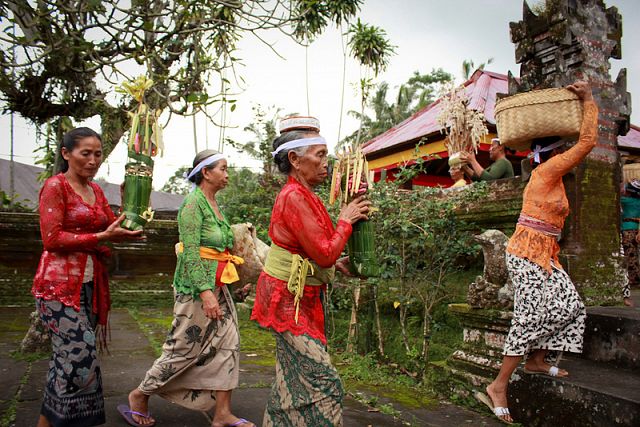
The occasion is quite remarkable from a Western perspective,
as participants set aside their daily duties and concerns to come together for
a collective endeavour, creating something beautiful for the gods.
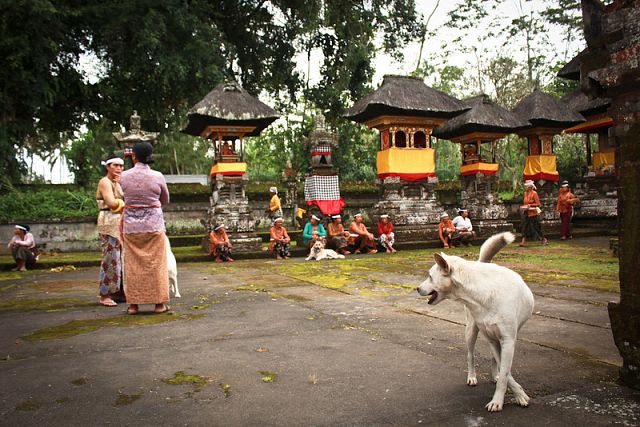
I pause to reflect.
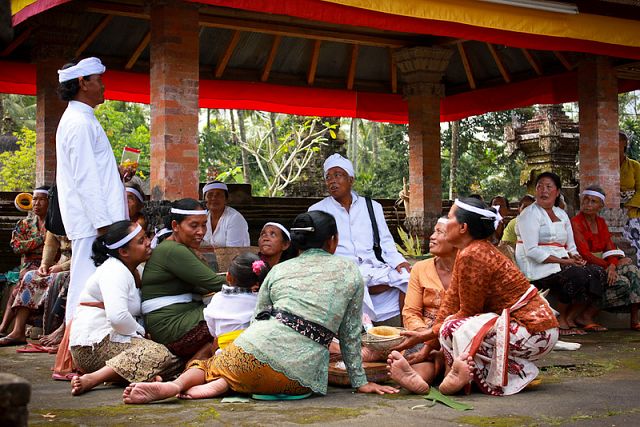
Usually, the entire community, or banjar, gets
involved in the preparation. Neighbours and relatives from the village gather
for a common, beneficial task—creating and organizing a multitude of details
for the upcoming ceremony. All this unfolds without a visible plan or a to-do
list. The work is organized through communication and an inherent understanding
of each person's role. There's no confusion, rush, or stress; everyone is
engaged in their task, carrying it out steadily and with inspiration (with pure
thoughts, as they would say in Bali).
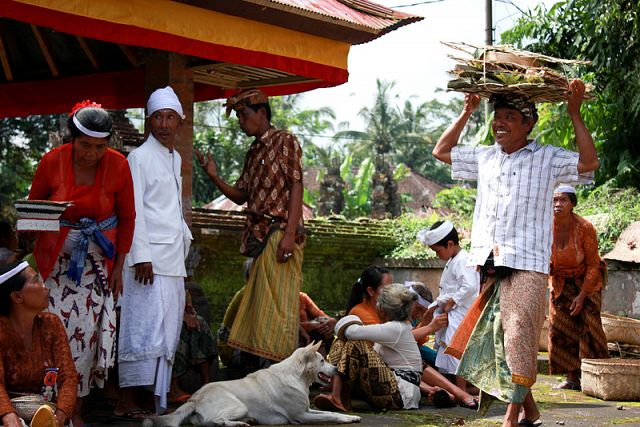
From generation to generation, they perform this work. Their
hands move automatically, using tools like knives and twigs to create beautiful
items from coconut leaves, flowers, bamboo, rice, and hundreds of other natural
products. They then assemble these items into stunning compositions to be offered
to gods and spirits during the ceremony. How they remember what item to place
where is beyond me! There are dozens, if not more, variations of offerings,
each comprising at least three ingredients. This is where the advice of the pemangku
(temple priest) or, at the very least, his wife comes in handy. It is their job
to know all the details.
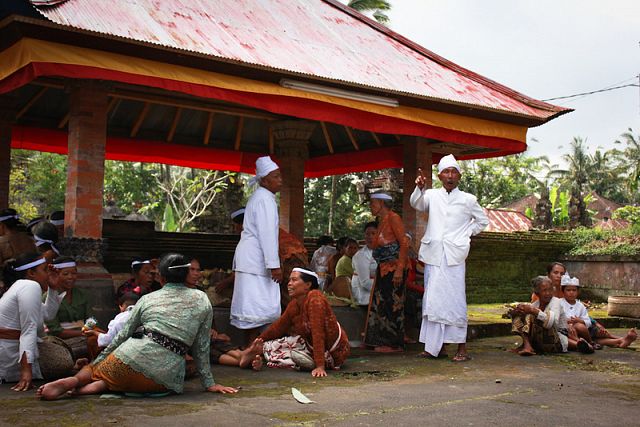
When I take a seat next to a group of women weaving
intricate offerings for the gods, known as banten, I naturally attract
attention. As I am dressed in the traditional ceremonial attire of kebaya,
sarong, and belt, I'm met with warm smiles and quiet whispers of approval. The
sight of a foreigner in traditional Balinese dress is both unusual and welcomed
in Bali.
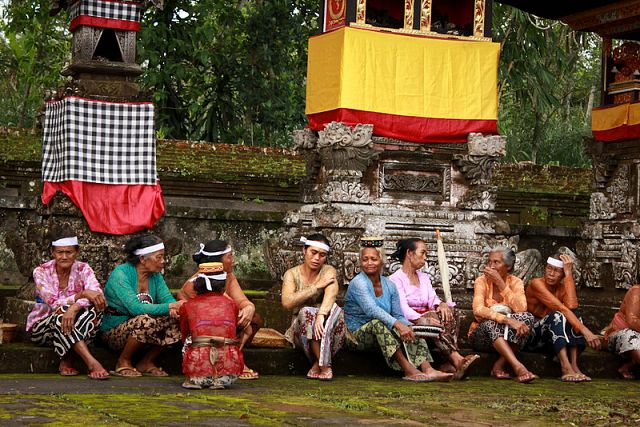
"Om swastyastu," I greet the women in Balinese.
"Om swastyastu," respond the women, without
pausing their work.
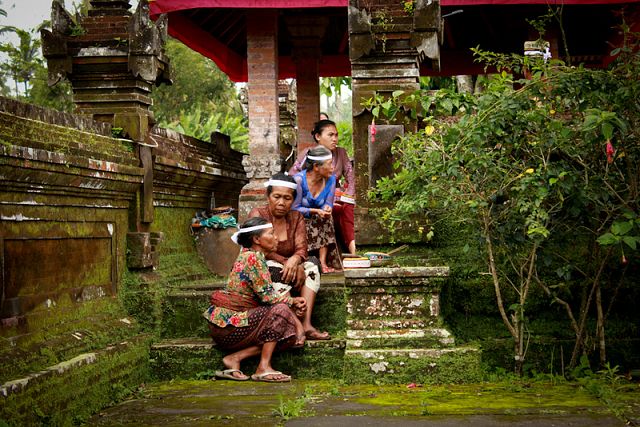
One woman, around 40 years old, smiles at me and offers
coffee.
Balinese coffee is prepared by steeping it in boiling water
and covering it to infuse. It's strong, served without milk, but with plenty of
sugar, and is typically drunk from glasses. It's polite to fill just half the
glass with coffee, never the full glass. In Bali, if a wife serves her husband
a full glass of coffee, it means she's upset with him for something.
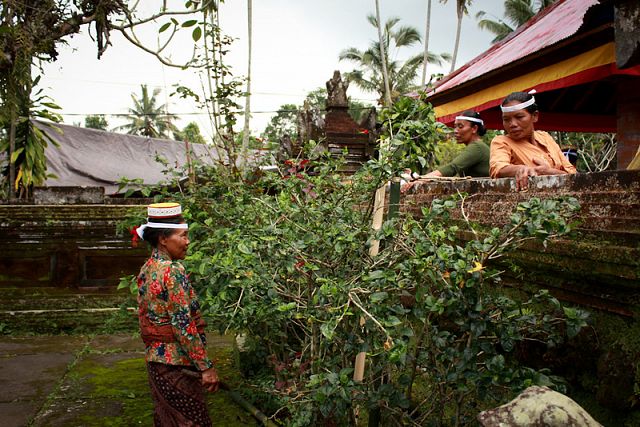
I take a sip of the coffee, offer the woman some nuts I
brought with me from home, and ask:
“Siapa nama anda?” (What's your name?)
“Saya Made” (I am Made)
“Saya Julia … Apa kabar?” (I'm Julia…How are you?)
“Kabar baik” (I am good), replies Made.
Made shows me how she makes a simple canang, a small
square offering used all around the island for daily rituals. Over coffee and
weaving offerings together, Made shares stories about her life. Through her
narrative, I gain an understanding of what "kabar baik" (I'm good)
means for an ordinary Balinese woman.
“What's your daily routine like?”
“I typically rise at five in the morning. First thing, I
sweep the yard.”
I nod. These are the sounds I hear every day when I wake up.
Everywhere you go in Bali, early in the morning there's usually the swishing
sound of brooms sweeping. It's a common sight to see Balinese women starting
their day by clearing yesterday's offerings from the ground.
"After that, I head to the market around six. It's
quite lively at that time, with plenty of chatter and haggling. I stock up on
fresh food for the day and buy flowers for offerings."
"Next, I prepare food for my family. I cook a large pot
of rice, some veggies, eggs, a spicy sauce, and occasionally, chicken or fish. What
I cook in the morning gets eaten over the course of the day for breakfast,
lunch, and dinner.”
"After that, I shower, dress in kebaya and sarong, then
go to pray. I place offerings to the gods at our family temple, in the kitchen,
and at the gate. I include some of the freshly cooked food in the offerings,
sharing with the gods first before we eat. Doing the offerings in the morning
ensures that our home is safe and protected for the rest of the day. The gods
are pleased; they particularly appreciate the flowers in the canang and the holy
water."
"And even the spirits are appeased; I leave segehan (another
type of offering, for the spirits) for them on the ground at the doorstep each
morning."
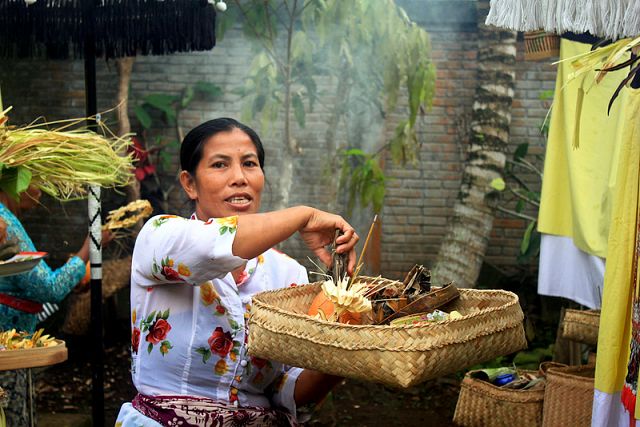
"And what do the spirits like?," I ask.
"They like ituk-ituk – a combination of hot and
cold energy. This is why I include ginger root (hot) and onion (cold) in the
segehan."
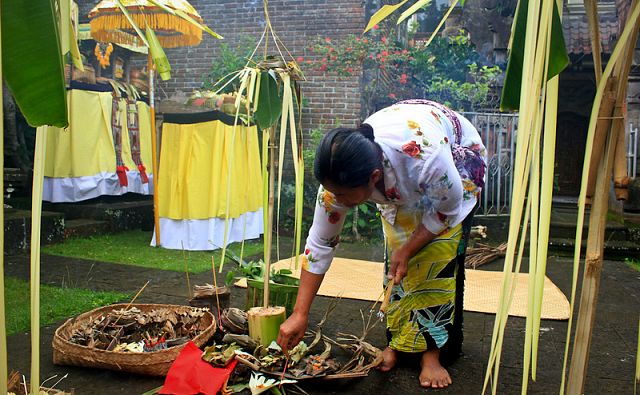
"In our free time, women weave offerings for the gods
using coconut leaves, flowers, and rice to safeguard our homes for the next
day. This practice has been passed down through generations, from my
great-grandmother to my grandmother and mother, who began teaching me at the
age of seven."
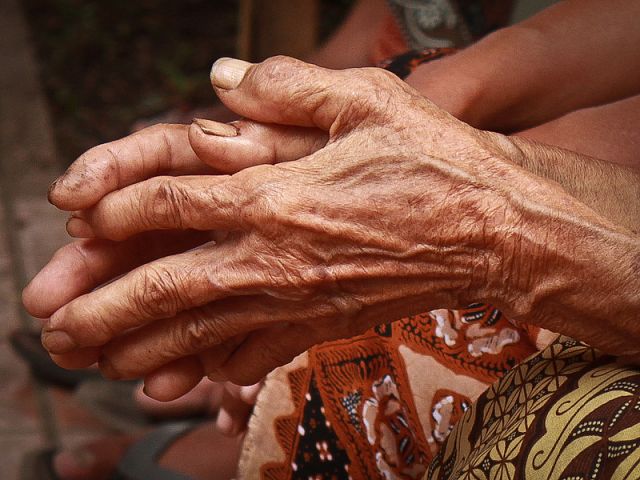
"Now I can do it with my eyes closed," Made
laughs. "When there are big ceremonies in the village, we gather with
other women and spend days preparing offerings..."
I see now what Made is getting at. Daily offerings are a
kind of meditation. You focus on pure thoughts about family, children, husband,
yourself, your community, and the gods. You infuse the offerings with positive
energy and then present these gifts to the gods, the wind, and the sun. The
outcomes may be fleeting, but it's the act of creation that holds true
importance.
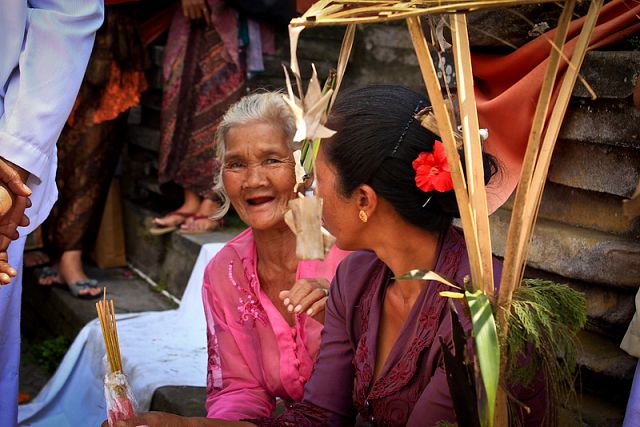
"Then I take care of our domestic animals," Made
continues, her hands deftly weaving coconut leaf ribbons into intricate
baskets. "Sometimes we keep pigs, but now we have only chickens, ducks, a
dog, and a cat. Of course, they all want to eat."

“After everyone is fed, it's time to do laundry in the canal
near the house and then hang it out to dry. By the way, do you know, hanging
laundry helps protect the house from thieves? Passing through someone’s laundry
is a very bad omen. You'll attract bad energy to yourself. That's why no thief
would risk breaking into a house if laundry is hung around the perimeter,” Made
whispers conspiratorially.
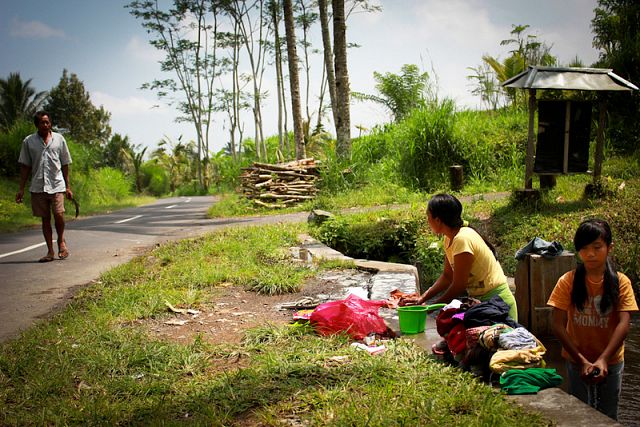
“At times, I assist with temple construction or other
communal projects, which are obligatory for all members of the community.
Temple restoration demands significant quantities of volcanic sand, transported
by trucks from the Batur volcano. Men load baskets with roughly 10 kilograms of
sand each, and we women transport these loads to the temple, carrying baskets
atop our heads. To ease the burden, we place towel turbans on our heads, upon
which we balance the baskets.”
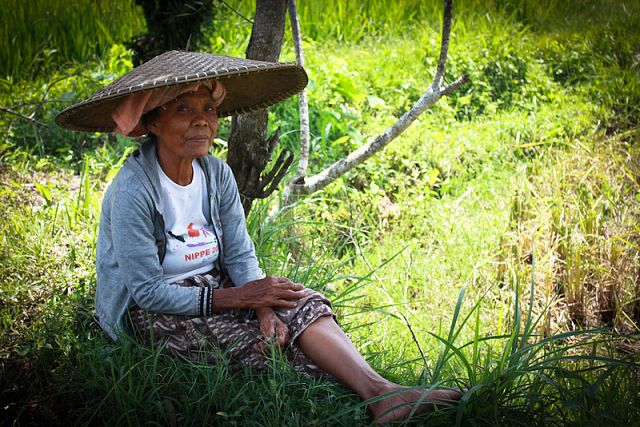
"This tradition has been passed down through the ages:
when something heavy needs to be carried, it's considered a woman's duty. Carrying
heavy items on the head is the most efficient method. As women, we are
accustomed to carrying heavy offerings on our heads since childhood. The head
is revered as a sacred part of the body, akin to a temple. Hence, offerings for
the gods and volcanic sand for temple construction are exclusively transported
atop the head."
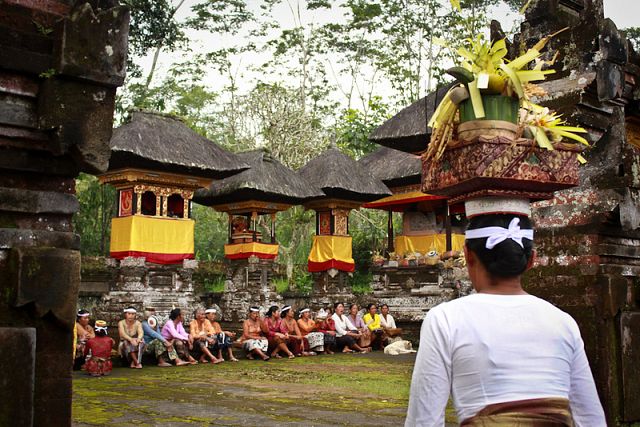
"We are paid for this work, but only symbolically. I
sew clothes for my family and sometimes make clothes to order for neighbours.
It's all just a little extra money."
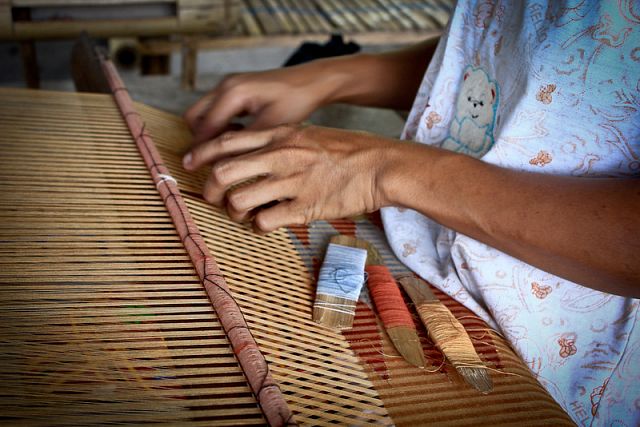
"During the harvest season, I join my fellow villagers
in the fields to harvest rice. We head out early in the morning, shielding our
faces and shoulders with scarves and dressing in warm clothes. This helps us
endure the heat as we spend around 12 hours manually pounding rice, which is no
easy task. However, rice is life—it sustains us, and we are grateful to the
gods for it.”
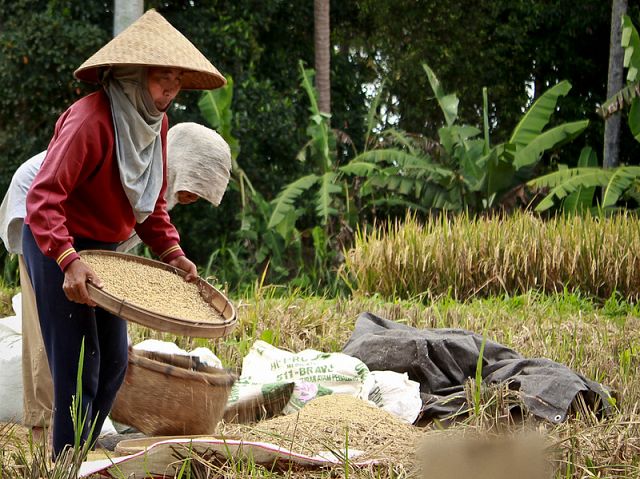
“You know, we only began processing government-subsidized
rice in the fields in the 1960s, after the powerful eruptions of Mount Batur
and Mount Agung. Many suffered during that time, and the fields were
devastated. Special rice imported from the Philippines was introduced, which
yields four times a year."

"Government-subsidized rice helps a lot in times of
hardship, but our traditional Balinese rice, cultivated on the island for
centuries, is deemed a divine gift. It's an offering to Dewi Sri, the beautiful
and benevolent goddess. We cherish Dewi Sri as a nurturer who brings abundance
and joy into our homes. Each household contains a small cloth dedicated to her.
From her essence sprout the miraculous rice shoots that sustain us. We hold
reverence for this gift, performing all fieldwork under the guidance of our
priest, who dictates the auspicious days for planting and harvesting, ensuring
each task is accompanied by rituals and ceremonies."
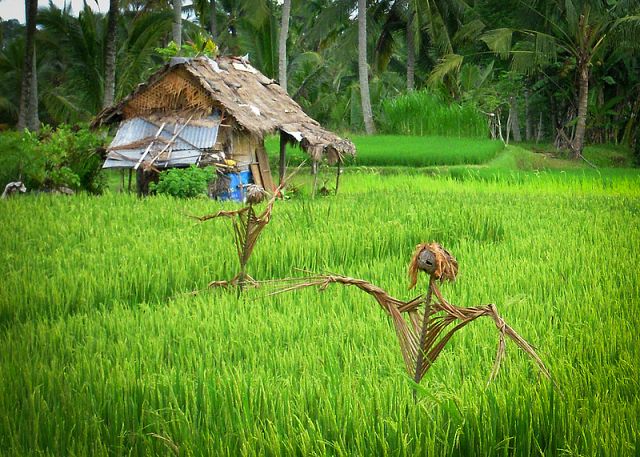
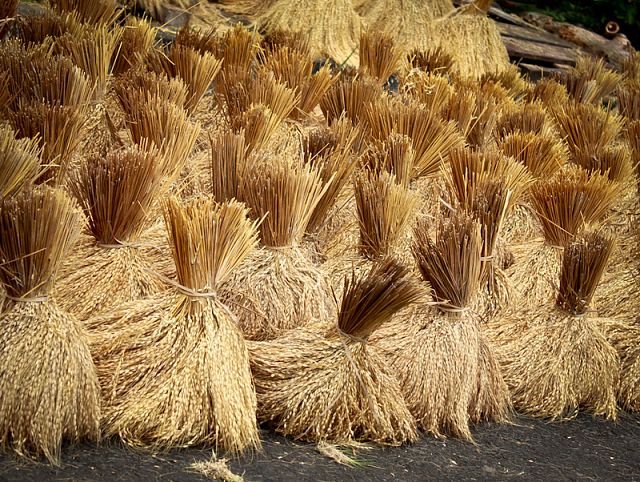
"In the evenings, after a hard day, I just watch TV or
sometimes play badminton with my son.”
"This is my life," Made beams with a sincere
smile.
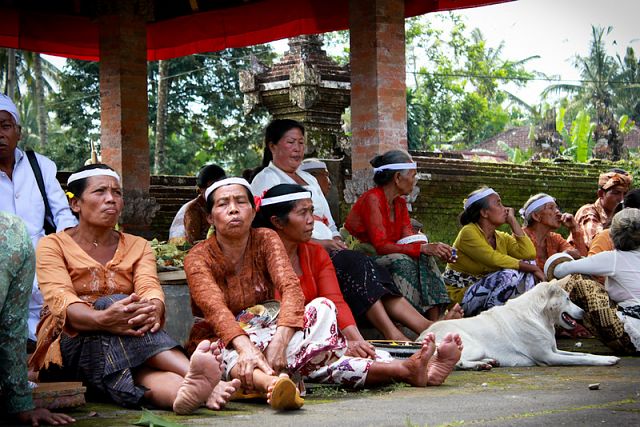
"Are you happy?" I ask directly.
"Yes. Happiness is what the gods bring into each day of
our lives. And they bring different things. There's a balance in that
too..."
So simple and yet so wisely spoken.
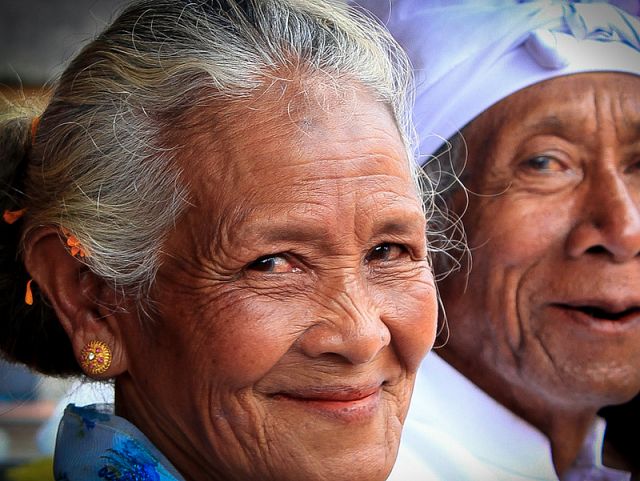
You can add one right now!